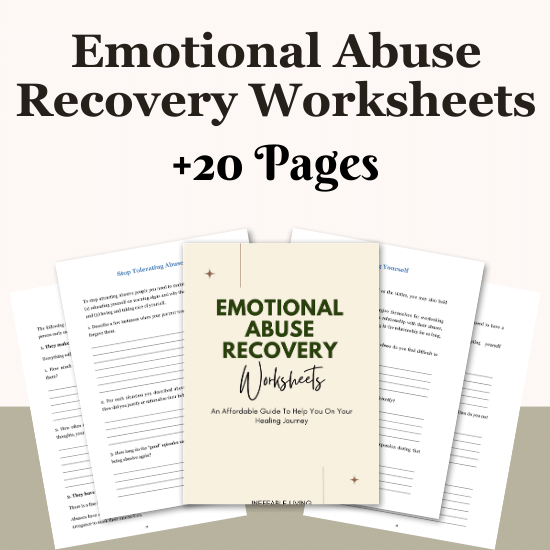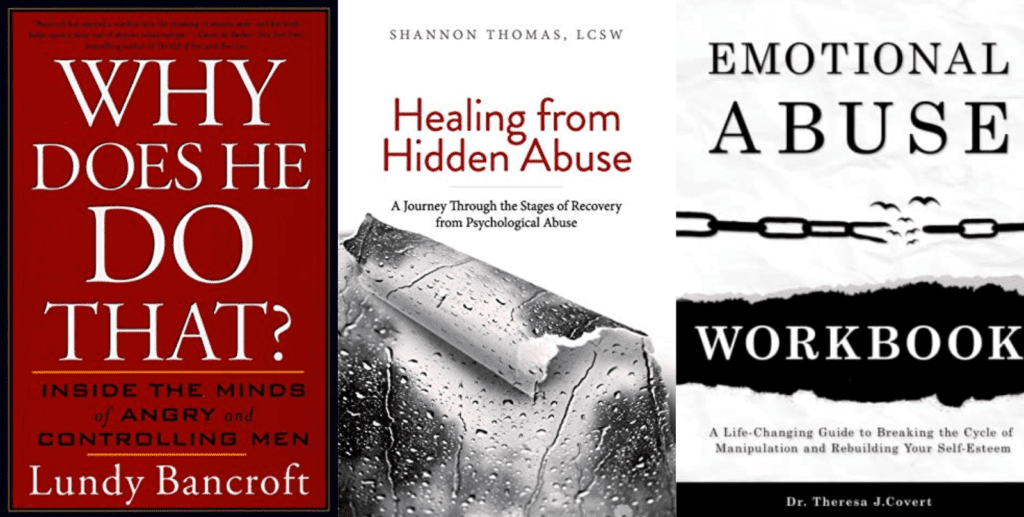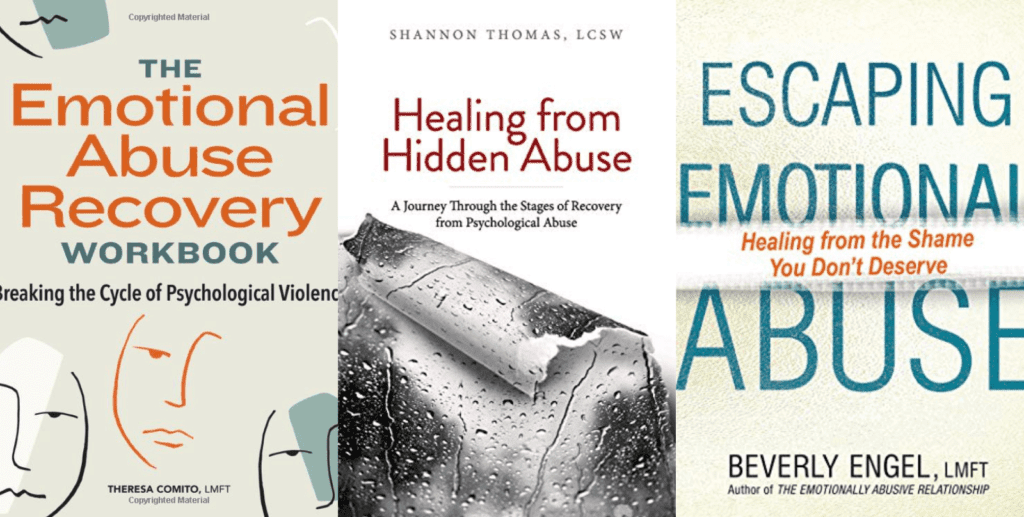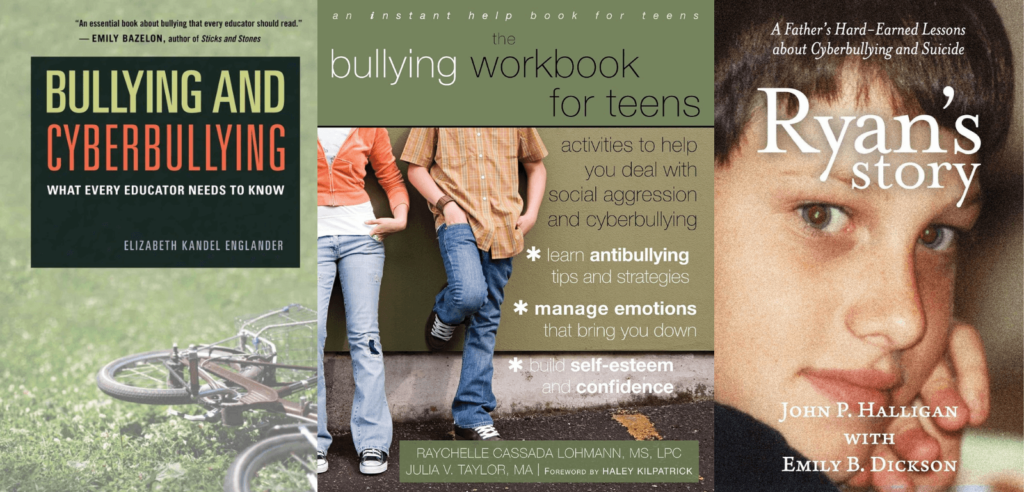The following are some of the best abuse books to help you embark on your recovery journey.
Disclosure: Some of the links below are affiliate links. This means that, at zero cost to you, I will earn an affiliate commission if you click through the link and finalize a purchase.
Abuse Books

1. Why Does He Do That?
By Lundy Bancroft
In Why Does He Do That? you will learn about:
• The early warning signs of abuse
• The nature of abusive thinking
• Myths about abusers
• Ten abusive personality types
• The role of drugs and alcohol
• What you can fix, and what you can’t
• And how to get out of an abusive relationship safely
Related: Healing From Emotional Abuse In 12 Practical Steps

2. Healing from Hidden Abuse
By Shannon Thomas LCSW
Healing from Hidden Abuse walks the reader through each of the six recovery stages researched and developed by the author. The stages are Despair, Education, Awakening, Boundaries, Restoration, and Maintenance. A guided Personal Reflections journal is included in the back of the book to help the reader go deeper in their application of the six stages of recovery. The journal can be used individually or in a small group setting.
Related: How To Stop Being Emotionally Abusive? Top 10 Strategies To Break The Cycle Of Abuse

3. The Verbally Abusive Relationship
By Patricia Evans
In this fully expanded and updated third edition of the bestselling classic, you learn why verbal abuse is more widespread than ever, and how you can deal with it. You’ll get more of the answers you need to recognize abuse when it happens, respond to abusers safely and appropriately, and most important, lead a happier, healthier life.
Drawing from hundreds of real situations suffered by real people just like you, Evans offers strategies, sample scripts, and action plans designed to help you deal with the abuse – and the abuser.
Related: Can Abusers Change? Top 17 Myths About Abusive Men That Make Women Stay With Abusers

4. The Emotionally Abusive Relationship
By Beverly Engel
The Emotionally Abusive Relationship will tell you how to identify emotional abuse and how to find the roots of your behavior. Combining dramatic personal stories with action steps to heal, Engel provides prescriptive strategies that will allow you and your partner to work together to stop bringing out the worst in each other and stop the abuse.
Related: Healing From Childhood Emotional Neglect In 6 Steps (+FREE Worksheets PDF)

5. When Loving Him Is Hurting You
By David Hawkins
Dr. David Hawkins, director of the Marriage Recovery Center, offers a guide to help you identify signs of narcissism, understand how your loved one’s issues are affecting you, and prepare a biblical game plan for freeing yourself to live courageously in light of God’s love.
Whether the man in your life can be diagnosed with narcissistic personality disorder (NPD), exhibits narcissistic traits and emotionally abusive behavior, or has arrogant and self-centered tendencies, the emotional pain he causes you is very real. Discover the truths, wisdom, and grace you need to spark change in your relationship, set boundaries, and experience healing.
Related: Top +25 Things Abusers Say To Their Victims

6. Emotional Abuse Breakthrough
By Barrie Davenport
In this book, you’ll learn:
- How to restore your shattered identity and sense of self
- How to cope with hopelessness and despair in long-term abuse
- How to stick to your non-negotiable boundaries, even if it means walking out the door
- The critical, iron-clad deal breakers that should cause you to pack your bags
- How to successfully navigate inner conflict and turmoil about leaving
- How to effectively confront your abuser about their unacceptable behaviors
- What it really takes for an abuser to make lasting change
- How to manage the resistant abuser if you choose to stay
- How to protect your children from an emotional abuser
- The 11-step preparation plan before you walk out the door
- The self-esteem boosting blueprint for a stronger new you
- The power of personal responsibility and a growth mindset
- How to establish the new baseline for a healthy, intimate relationship to use for life
- The next steps to create an abuse-free future
Related: Am I Being Verbally Abused Quiz

7. Adult Survivors of Toxic Family Members
By Sherrie Campbell PhD
In Adult Survivors of Toxic Family Members, psychologist and toxic-family survivor Sherrie Campbell offers effective strategies for setting strong boundaries after ending contact with a toxic family member, and provides powerful tools to help you heal from shame, self-doubt, and stigma. You’ll find the validation you need to embrace your decision with pride and acknowledgement of your self-worth. You’ll learn how to let go of negative thoughts and feelings. And finally, you’ll develop the skills needed to rediscover self-care, self-love, self-reliance, and healthy loving relationships.
Related: Emotional Abuse In Relationships Quiz

8. Toxic Parents
By Susan Forward, Craig Buck
In this remarkable self-help guide, Dr. Susan Forward draws on case histories and the real-life voices of adult children of toxic parents to help you free yourself from the frustrating patterns of your relationship with your parents — and discover a new world of self-confidence, inner strength, and emotional independence.
Related: Top 10 Journal Prompts For Narcissistic Abuse (+FREE Worksheets)

9. The Emotional Abuse Recovery Workbook
By Theresa Comito LMFT
In this workbook you’ll learn to:
- Identify emotional abuse—Begin to recognize, acknowledge, and understand the dynamics of emotional abuse, and start your recovery process.
- Take action—Move into guided examinations of your relationships. Make an exit plan with boundaries and safety nets to build new, healthier skills, and rediscover self-compassion and self-care.
- Move forward—Avoid repeating old patterns. Rebuild. Map out next steps into healthier relationships and greater independence while you enhance your network of supporters.
Related: Are You A Victim of Narcissistic Abuse Quiz

10. Emotional Abuse Workbook
By Dr.Theresa J. Covert
The workbook includes:
– Trauma Bonding: Why you CAN’T Leave an Abusive Relationship
– How to outsmart narcissists silent treatment and end the pain today
– The psychological disorders that feed emotional abuse
– Unhealthy vs Healthy relationships: The signs you need to know
– The easiest ways to identify emotional abusers FAST
– 13 Must know signs of Emotional Abuse
– What you MUST do to LEAVE an Emotionally Abusive Relationship
– BOUNDARIES you MUST set with an abuser
– How To Forgive When You Can’t Forget
– The Reasons why Empaths attract toxic people and how to protect yourself
– Emotional healing: Techniques to overcome negative emotions
– The steps to create an abuse-free future
And so much more …

How Abuse Books Can Help
Abuse books can be incredibly helpful in various ways. Here are a few ways they can assist:
1. Raising Awareness: Abuse books help bring attention to different forms of abuse, such as emotional, physical, or sexual abuse. By shedding light on these topics, they help make people aware of the various signs, effects, and consequences of abuse.
2. Education: These books provide valuable information and educate readers about the dynamics of abuse, including the patterns, behaviors, and tactics commonly used by abusers. They also offer insights into the experiences of victims and survivors, helping others better understand their struggles.
3. Empowerment: Abuse books often provide practical tools and strategies that empower individuals to identify and escape abusive situations. They may offer guidance on setting boundaries, building self-esteem, and developing healthy coping mechanisms, empowering survivors to reclaim their lives.
4. Validation: For those who have experienced abuse, reading about similar stories can be validating. It reassures them that they are not alone and that their experiences and feelings are valid. This validation can be an essential step toward healing and recovery.
5. Support and Guidance: Abuse books often provide support and guidance for individuals who may feel isolated or overwhelmed. They might include tips on seeking professional help, finding support groups, or connecting with resources, offering a sense of guidance through difficult times.
Conclusion
It is important to note that abuse books can be triggering for some individuals.
If you are considering reading an abuse book, it may be helpful to have a support system in place and engage in self-care practices during and after reading.



